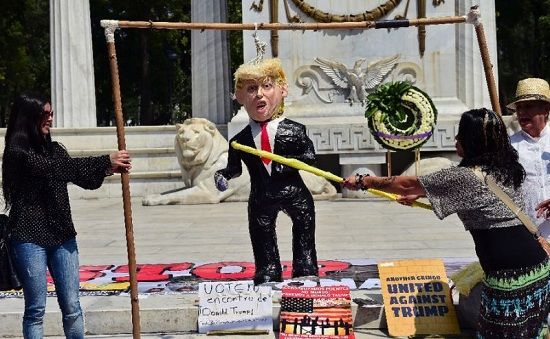Many was in shock, but Mexico was hurt even more.
Mexicans watched their televisions in horror as Donald Trump beat Hillary Clinton in the U.S. election, putting into power a man who criticized them and their relatives in the U.S. and promised to build a wall between the nations after almost a century of peace.
Alessandro Mendoza, a 29-year-old lawyer from Mexico City said “The world has gone crazy,” while watching the results on two giant screens at a packed gathering of Mexican and American businessmen at the American Society. Mendoza who has cousins in Miami, put his hand to his mouth in surprise and whispered to his friend, “we’re screwed.”
Thousands of the capital’s residents had planned to celebrate a Trump defeat at the Angel of Independence in the city center, where soccer fans party after the national team wins. But as the final results came in, the Paseo de la Reforma suddenly became very silent.
"Americans have disappointed me," said Jose Enrique Guillen, a 28-year-old sociology student at the Pinche Gringo bar in the capital. "I feel the hatred. I’m sad and worried."
From the moment Trump began his campaign by calling undocumented Mexican immigrants “rapists,” the Republican used Mexico as a scapegoat to drive home his concerns about free trade and undocumented workers.
Now, after months of beating Trump piñatas, burning his effigies and donning wigs to satirize him in theaters, Mexicans are facing a reality that could damage the nation’s economy and throw the lives of millions of migrants into chaos.
The peso slumped more than 11 percent at one point to a record low, breaching 20 per dollar for the first time, the worst performing financial asset of the election night.
"This is the most important event in the U.S. for Mexico since the war of 1846," when U.S. troops invaded the country, Jose Antonio Crespo, a political analyst at the Center for Economic Research and Teaching in Mexico City, said before the result. "If Trump is attacking us, and the economy is being affected, the people are involved. We became part of the election."
Mexico’s involvement in its neighbor’s presidential campaign was unprecedented. Its consulates across the U.S. mounted a campaign to turn legal residents into U.S. citizens, ostensibly to vote against Trump. At home, senators appeared on T.V. to urge Mexicans in the U.S. to cast their ballots, while presidential hopeful and former first lady Margarita Zavala took to Facebook to chastise Trump. A group called #GringosAVotar called on Americans living in Mexico to send in their votes.
“It’s a result that surprised us all," said Senator Gabriela Cuevas, head of Mexico’s Senate foreign relations committee and a member of the opposition National Action Party. “It’s worrisome that a person who seems to take decisions with little information and with such ignorance will have a majority in both chambers.”
Trump’s campaign, like Britain’s Brexit vote before it, rode an anti-immigrant wave, with the Republican blaming foreign workers in the country and free-trade agreements for taking American jobs. In addition to building a wall between the U.S. and Mexico, he promised to deport criminal aliens, tighten border controls and institute an “American workers first” labor policy.
“Mexico has been attacked in many ways” during the campaign, said Marcela Guerra, who heads the nation’s Senate committee on North American relations and is part of the Organization of American States’ first observation mission to a U.S. election. Speaking before the election result, she said Mexico has “a lot to lose.”
